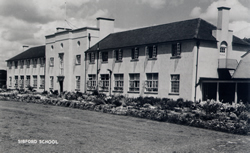

Sibford - the Quaker School Elizabeth Jolley
attended from 11 to 17 years of age.
Sibford
Founded in 1842 as a coeducational institution with an agricultural emphasis, Sibford evolved a more academic focus by the 1900s, although it was not in the upper echelons of the nine Quaker schools in the United Kingdom. At first, Jolley was powerfully homesick there, revealing her ambivalence about home life in Wells Road as well as the fact that she felt like an outsider for not being a birthright Quaker. Her attitude soon changed, primarily because the dozen staff members (half women, half men, most but not all of them Quakers) were reasonably well qualified and quite dedicated teachers who genuinely cared for their students, several remaining her lifelong friends. Jolley was well looked after in all ways at Sibford and received a good education except for the fact that she left the school innocent of mathematics.
While there she particularly enjoyed her formal introduction to music and literature which was made possible by EA (Arthur) Johnstone, an awkward man with unfortunate mannerisms, a conscientious objector who, like Jolley's father, had been imprisoned. Sibford's fourth Headmaster, he put his somewhat controversial stamp on the school by introducing the arts to the curriculum in spite of the Quaker ethic that discouraged frivolous activities. He hired two women to teach music and also invited students to listen to classical records in his study or in the girls' Common Room in The Manor. Jolley later wrote to a school friend that "I have always felt that my love of music came from his choral sessions - when I listened with much pleasure to your voice singing solo - and those wonderful gramophone times when he played records and talked about music" (25 March 1993 postcard to Edith Worrall).
Her English teacher, Edith Burgess, was responsible for inspiring a number of students in literature, for example by introducing Jolley's fellow student Paul ("Yes, Minister") Eddington to drama, directing an annual student production and taking her students to Stratford on Avon for a Shakespeare play every year. She developed Jolley's critical skills by way of a syllabus containing writers like Arnold and Hardy, Browning and Brontë, but also more modern ones like Virginia Woolf. By way of the précis and lit crit essays, Burgess also developed her writing skills, including "creative writing," for Jolley inevitably wandered in her topical essays from the subject assigned to whatever she felt most strongly about at the time. In her own time, Jolley read widely and pursued her own writing projects, including three "bunny stories" for children and an intriguing piece called "Her First Minuet" in which she presumably identified with the heroine Ann Kemmeter, named after Marie Kemmeter, Otto Stapf's niece. Regarding the piece as "Much too short but good," Burgess graded it 7 out of 10, the mark she most frequently gave her.
Sibford was subject to the usual boarding-school nightmares of bullying and sex. Eddington testified to the former in his autobiography So Far, So Good, but was oblivious to the latter. However, another student, James K Baxter (later New Zealand's iconic poet of the 1950s and 1960s), wrote scathingly of "barbarities of the dormitory" and "undesired sexual enlightenment." [1] Jolley presumably was aware of events more similar to the ones Baxter described, judging by the scene in her novel My Father's Moon (pp. 33-39) where older boarding-school girls bully and sexually humiliate a younger one.
She also had two other maturing experiences while at Sibford. One was when Kenneth Berrington took her and her mother to the continent for six weeks in 1938, a trip recounted in her essay "Mr Berrington." It was a confronting experience for her, because she sensed it was distressing for her father. At the same time, it was a broadening experience because she ended up wanting to be like Kenneth Berrington.
The second such experience was her stay in a Jungmädelführerinnenlager
or girls' leadership camp near Hamburg, Germany, in August 1939. In addition
to encouraging singing, games and drama activities, the camp extolled
Hitler's virtues, hopefully pointing out that "The Führer eats
green apples every day" in order to get the girls to tolerate their
Spartan meals ("Of Butchers and Bilberry Baskets" p. 41). Jolley's
visit with friends of her mother after the camp concluded was abruptly
aborted when the husband hurried her onto a cargo boat bound for England
a few days before Hitler invaded Poland (p. 42).
1. Quoted in WH Oliver's James K Baxter: A Portrait (19 and 24). Wellington: The Port Nicholson P, 1983.
... "I have always felt that my love of music came from his choral sessions ..."
... "The Führer eats green apples every day"...